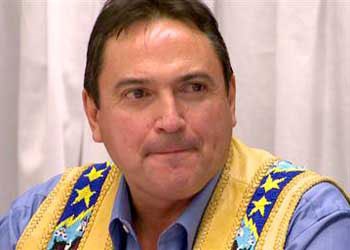The chief of Little Black Bear First Nation has again taken on a larger role in native governance in Saskatchewan. Fifty-year-old Perry Bellegarde was elected chief of the Federation of Saskatchewan Indian Nations (FSIN) during elections in Saskatoon last Thursday during which he presented his vision regarding treaties, First Nations' self determination and jurisdiction.
He'll represent the province's 74 First Nations. For Bellegarde, the victory over two other candidates - Morley Watson of Fort Qu'Appelle and a member of Ochapowace First Nation, and Delbert Wapass, chief of Thunderchild First Nation near North Battleford - means he's returning to a job he's well acquainted with.
Bellegarde, who served two terms as FSIN chief from 1998-2003, was elected on the first ballot with 488 votes while Wapass finished second with 240.
Watson garnered 182 votes. In a recent statement Bellegarde said his solid platform that focused on treaty implementation, self determination and jurisdiction resonated deeply with the 1,000 delegates as did his announced intention to steer the FSIN back to being an effective lobbying organization.
"There's a lot of work we got to do nationally and internationally in terms of promoting that political strategy regarding our rights. We have to define and articulate a legal strategy and a political activist strategy.
"All three things resonated (with delegates) because once you start looking at all those three things - we always say we encourage people to be comfortable with treaty implementation and self determination because that's good for Saskatchewan, that's good for Canada. That includes concepts like revenue-benefit sharing, participating in the economy."
A defining issue of First Nations members' lives today is poverty, Bellegarde suggests, and there are high costs as a result of that poverty to all Canadian society; it's essential the socio-economic gap between First Nations and the rest of Canada be narrowed.
First Nations want to see the Indian Act, a piece of archaic legislation that controls nearly every facet of First Nations' existence, eliminated and replaced with a "treaty implementation act" of which First Nations should be drivers of the process, Bellegarde says.
"We have to be involved in the planning and the organizing, the directing of any process that deals with the amendments or changes or deletions of the whole Indian Act because it affects our people and our rights."
During his involvement in First Nations leadership roles, Bellegarde has seen some progress but he understands the enormous amount of work that has to be done and the length of time it will take.
FSIN has to develop a long-term, strategic plan to deal with self determination, recognition for land, a resource-revenue sharing and treaty implementation, Bellegarde says, while pointing to some of the progress First Nations have made in areas like Treaty Land Entitlement and gaming.
"(But) we need to do more, to deal with poverty and create jobs for our people, more education and training opportunities so our children came participate in the economy."
As the new leader of the FSIN, Bellegarde says his mandate is to provide a vision and create hope that there's a better future for First Nations people, that life indeed is going to get better.
"It's all about equality. It's about closing the socioeconomic gap. The treaty relationship we have with the Crown was one based on peaceful co-existence with our white brothers and sisters and we were supposed to equally benefit from the land and resource wealth.
"Right now we see one side benefiting higher than the other side. We need to close that gap and become truly equal," Bellegarde concludes.




